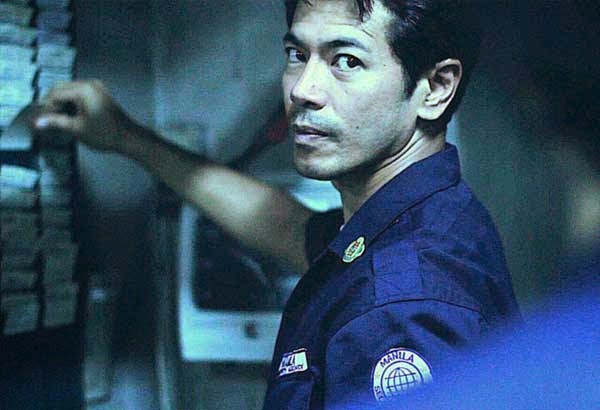A family on fire.
"Multiply those odds by countless
generations, against the odds of your ancestors being alive; meeting; siring
this precise son; that exact daughter... Until your mother loves a man she has
every reason to hate, and of that union, of the thousand million children
competing for fertilization, it was you, only you, that emerged. To distill so
specific a form from that chaos of improbability, like turning air to gold...
that is the crowning unlikelihood. The thermodynamic miracle."
– Dr Manhattan (Watchmen, 1987)
Starting off like a typical 'family' film as we get to see the twin
siblings Simon and Jeanne Marwan (Maxim Gaudette and Mélissa Désormeaux-Poulin)
trying to make sense of their late mother's strange last will, the film makes
it apparent that the film's conflict will strongly be of familial nature, and
its plot revelations be more implosive in tone. "Incendies", which is
basically Sophocles' "Oedipus Rex" minus all the prophecies and is
based on a play written by Wajdi Mouawad, is Denis Villeneuve's quiet yet
intense study of a nuclear family that harbors a secret so painful that it
gives the film a distinct feel of a horror story. The film may not be
necessarily entertaining or generally appealing for audience to thoroughly
enjoy, but it is the kind which leaves a bitter taste in the mouth, and then
makes you wonder if such bitterness is really that of a bad thing.
"Incendies", as what I've repeatedly said about emotionally
unsettling films, is a difficult one to sit through, but will nonetheless make
you sit back in awe at Villeneuve's deftness as a peculiar storyteller. Instead
of letting the film progress just like the objective mystery piece that it
should be, Villeneuve is quick on shifting the film's point of view, with it
jumping from the twins', their long-lost brother's, to their mother Nawal Marwan's,
and then back again. There's also this ambivalent placing of blood-red title
cards in the beginning of each of the film's chapter, which does nothing but
enforce the film's narrative ambiguity even more. The heavy reliance on political
and religious overtones, coupled with the positioning of Nawal Marwan as a
reckless activist, also cleverly distracts from the film's shocking twist in
the end, which, as what I've mentioned, hits close to freaking home as any
bloody secret can get.
The performances in the film, which are all quiet, naturalistic, and
nothing particularly scene-stealing or remarkable, take the backseat in favor
of the film's slew of heavy and perception-altering revelations, which is,
admittedly, "Incendies'" true selling point. Lubna Azabal's turn as
Nawal Marwan, however, is, simply put, nothing short of stunning, which is only
fitting because her character is, without a doubt, the film's heart and
soul.
Again, just like any other film with such a quiet, economical pacing, it
may really take a while before "Incendies" can grab your attention.
But once it does, rest assured, it is as tight as any strongman's grip, and the
bad news is that it will keep on tightening the more you think about the film.
It's a 'Holy shit, what the hell have I just seen?!' type of cinematic
experience, and I tell you, its effect simply just won't go away. And even
though its impact ranges from the religious to the utterly ideological, what
"Incendies" is all about is how it has miraculously managed to make a
film about an otherwise obscure conflict in an equally unknown Middle Eastern
country and make it very personal and relatable regardless of racial boundaries.
The film is a powerful examination of faith marred by senseless conflicts, and
also of fate and how it oftentimes fucks everything up to the point that life
ultimately mirrors the cruel formula of a Greek tragedy. But as what this film
suggests, out of such an anomalous fate, out of a myriad of almost literary
misfortunes arises a certain kind of miracle that "Incendies",
despite it being a thematically unsettling film, was able to hold on to the
same way Dr. Manhattan, a God-like entity, did when he mused about how the
conception of human life is the reason why the world is worth saving.
Villeneuve may have directed the most disturbing family film there ever
will be, but in the middle of "Incendies'" abundant cynicism, he also
wants to make it known that there's still something pure and outwardly lovely
in the sordid little truth that the Marwans are trying to unearth. Suffice it
to say, there's still an element of bittersweet pain in finding out a certain secret
no matter how pedestrian or persistently life-changing it is. This then reminds
me of the ending to Roman Polanski's "Chinatown". Jake Gittes (played
by Jack Nicholson), after witnessing with his own eyes how a decades-old secret
savagely unravel, his friend whispered to him, distraught and all, "Forget
it, Jake. It's Chinatown." Now, if only someone can gently whisper the
same to any of the Marwans, then coping would be easier. Or would it? Though
the film's story consistently progresses with closure in mind, the film is
still, by and large, a haunted soul. The secret was known, but then what?
Villeneuve seems content in ending his film with a depleted sigh of relief and chests
heavy with sadness and guilt. And as how Dr. Manhattan would put it, "It
ends with you in tears."
FINAL RATING






.jpg)






.jpg)





